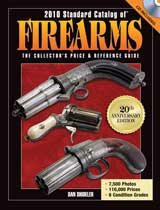What Auctioneers Look for in a Consignor
Across the board, firearms auctioneers state that selling firearms at auction requires consignors who are motivated and realistic. For example, Weber says that he first looks for someone who listens to our appraisals/auction projections. ”All we do all day and night is sell guns, so if we have sold their guns hundreds of times, we know the value,” he says. ”If the consignor disagrees with our assessment, that can spell problems down the line.” So the best consignor, says Weber, is “the one who believes without qualification that we are going to give their firearm the same attention and promotion we would give our own firearm.”
Larry Wells states that it’s very helpful for consignors to “look at the bottom line” and not at the final auction prices of individual items. “I want a consignor to tell me something to the effect of, ‘I’d like to see about $50,000 for the lot,’” says Wells.
The best consignor, says Kramer, is someone who is ready to sell. “Some sellers will sell if they get a certain price for every item; that is a seller who is not ready to sell,” says Kramer, “and that is not a good auction client.” He says about 90% of the auctions are “unreserved,” meaning the items will sell regardless of price. “We spend a lot of time and money advertising these auctions and most items will bring what they are worth.”
When there is a reserve price, Kramer says he makes sure that the reserve is reasonable, “one that I think is fair, not some crazy price that this one guy who never saw the gun said it should be worth.” He adds that if his sellers are not happy with what he feels is a reasonable price, he simply won’t offer the item at auction. “No sense wasting my time and my buyers’ time on lots that have unreasonable reserves,” he says. With auctions, he says, sales and profits always seem to even out—some guns sell for a little less than they should and other guns seem to bring more that they should. Of course, says Kramer, “Everyone always seems to have a good story of some gun at an auction that brought way more than they expected. I like those stories especially when they are talking about my sales.”
James Julia prefers consignors who meet two key criteria: First, they must have quality goods to sell. Second, they are motivated, realistic, and conservative in estimating value. With that kind of consignor, he says, his auction company can then create a great marketing plan and establish a selling price or “put it at auction and let the market decide.” Consignors need to know that estimating low, says Julia, will sometimes cause a good to overperform in an auction.
Both auctioneers and sellers desire goods to sell well. “The more a seller makes, the more we make,” says Weber. “Once the seller understands that, the auction process is a beautiful thing!”
This article appeared in the August 2, 2010 issue of Gun Digest the Magazine.
Recommended books for gun collectors:
 Standard Catalog of Firearms, 20th Edition.
Standard Catalog of Firearms, 20th Edition.
The Official Gun Digest Book of Guns & Prices 2010, Rifles, Pistols & Shotguns
5th Edition

![Best Concealed Carry Guns In 2025 [Field Tested] Wilson Combat EDC X9S 1](https://gundigest.com/wp-content/uploads/Wilson-Combat-EDC-X9S-1-324x160.jpg)


![Best 9mm Carbine: Affordable PCCs [Tested] Ruger Carbine Shooting](https://gundigest.com/wp-content/uploads/Ruger-Carbine-Shooting-100x70.jpg)
![Best AR-15: Top Options Available Today [Field Tested] Harrington and Richardson PSA XM177E2 feature](https://gundigest.com/wp-content/uploads/Harrington-and-Richardson-PSA-XM177E2-feature-100x70.jpg)
